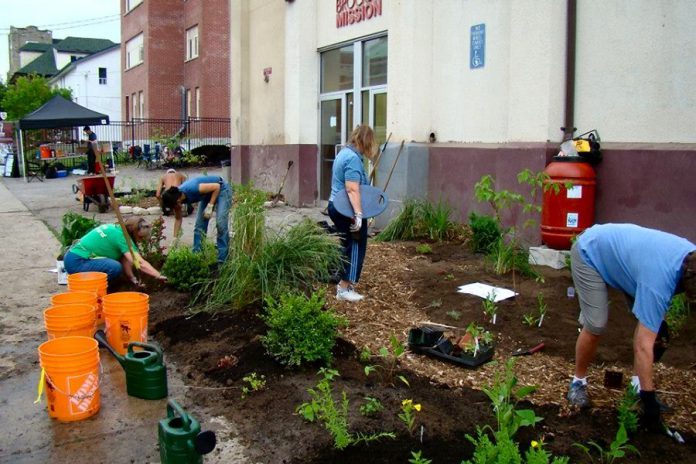
By now we’ve all heard about the havoc caused on Monday by the rapidly rising floodwaters in Burlington. Roads were impassable, damage was caused to homes, and property and lives were disrupted. The flooding was caused by thunderstorms which moved through that area dumping two months worth of rain in only a couple of hours.
While that volume of rain would likely cause flooding no matter where it fell, the situation was exacerbated by the fact it fell on an urban area with fewer places for it to absorb into the ground, a problem that only worsens as green spaces disappear.
Flooding aside, another big concern about urban storm water is what it is carrying into our waterways. Rainwater flowing over paved surfaces takes everything it encounters with it as it makes its journey to the closest storm drain. There doesn’t have to be a deluge of water for this to happen — a slow gentle rain will have the same result.
Pet feces, detergents and cleaners, and spilled motor oil and other automotive fluids all can be found in storm water runoff. With an increasing number of paved surfaces, this contaminated water is finding its way into our lakes, rivers and streams more and more, leaving a legacy of fouled water for future generations.
What can you do?
There are three steps we all can take at home, which will help make our lakes and rivers cleaner and improve the environment for aquatic wildlife and plants. These include slowing the water down, allowing it to be soaked up by vegetation and soil, and by keeping it clean in the first place.
1. Slow It Down
In urban neighbourhoods, most water doesn’t get a chance to be absorbed into the ground. It hits the asphalt surface and is quickly drained away, taking with it pollutants that are harmful to our environment.
We can slow the water down through a variety of means. If your drain spouts drain onto a driveway or other paved surface, disconnect them and allow that water to disperse onto your lawn. Not only will your lawn will benefit from the additional water, but it will soak into the ground rather than burdening drainage systems.
Another option is to install a rain barrel. Here in Peterborough, customers of Peterborough Utilities receive a discounted price if they purchase their barrel from GreenUP. Storing rainwater for use on sunny days will cut your water consumption and allow you to water your lawns and gardens should restrictions come into place in the coming months.
2. Soak It Up
Increase the areas on your property that will allow rainwater to be soaked into the ground.
If you plan on resurfacing your driveway, consider using permeable paving options that allow water to reach the ground below, while still giving you a hard surface.
Planting trees and shrubs also help as they absorb copious amounts of water through their roots.
3. Keep It Clean
Pick up pet waste. Four times more harmful than human waste, it gets carried off sidewalks and streets and input directly into bodies of water via storm drains, untreated. Use compostable bags to pick up and dispose of it safely.
Washing your car on your driveway rinses whatever is on the driveway into the storm sewer. This can be avoided by using a commercial car wash, where the wastewater is treated. Another option is to park the car on your lawn to wash it. All the water flows off the car and into the grass, eliminating the need to water later.
Spread natural fertilizers on lawns and gardens. Fertilizers contain nitrogen, phosphorus, and potassium. When applied in granular form on compacted lawns, it is easy to lose most of it down the storm drain the next time it rains. Excess phosphates from fertilizers can cause an algal bloom and overgrowth of invasive plants in the nearest lake or river. Apply composted organic matter to well-turned beds to help it soak into the ground the next time it rains. When applying to lawns, always aerate first.
Taking a few small steps like collecting water in rain barrels for later use, or making an extra effort to pick up after your pet, can have big results in the future. Keeping toxic elements out of storm water runoff will lead to cleaner and healthier bodies of water for years to come.


























